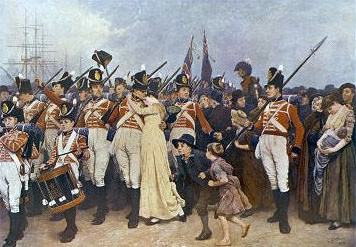|
The following details for the Inniskillings are provided by Copeland-Trimble and Joseph's service is drawn from musters and paybooks (National Archives).
On return from North Holland in 1799, the Inniskillings were quartered in Dover Castle. At the turn of the year, Sergeant Joseph Ratcliff transferred back to Lieut.-Col. Frederick Maitland's Company and spent the first four months of 1800 at Dover and nearby Deal.
In May 1800 General Sir Ralph Abercromby was assembling a force to take the land war to the Mediterranean. As part of the preparations, the Inniskillings formed a second battalion of volunteers from the Irish militia. In June Joseph transferred to Lieut.-Col. Samuel Graham's Company and both battalions marched to Swinley Camp on Bagshot Heath near Windlesham. Joseph was earning 1s 5¼d per day.

British troops embarking for the wars
In August both battalions marched to Portsmouth where they embarked for an expedition against Ferrol in north-east Spain which was assembling in Quiberon Bay under Sir James Pulteney. They set sail on the 6th and landed on the Doniños beach near Ferrol on the evening of the 25th after Spanish positions had been bombarded by British ships. They encountered little opposition and soon commanded the heights overlooking the Castle of San Felipe and the town and harbour of Ferrol. The following morning saw skirmishing and the Spanish were forced to retreat into their fortifications but their gunboats in the harbour kept up a withering hail of fire. Pulteney judged that the town and harbour were too well defended to take and gave the order to withdraw that evening. The Inniskillings re-embarked without incident and the fleet sailed the next day for Gibraltar where they joined Sir Ralph Abercromby in early September. Pulteney's decision was not widely supported and he had to defend it in the British Parliament in 1801 (Cobbett).
In October 1800 Sergeant Joseph Ratcliff and the Inniskillings were amongst troops on board the fleet anchored in Cadiz Bay in readiness for an assault on Cadiz. The action was abandoned because there was an epidemic of yellow fever in the city.
Meanwhile Abercromby had turned his attention to expelling the French from Egypt and on 24th November began assembling his forces at Malta where the French commander had surrendered on 4th September following a two year blockade which ended with more than 100 of his men dying every day from starvation and typhus.
- Copeland Trimble, W.,The Historical Record of the 27th Inniskilling Regiment: From the Period of its Institution as a Volunteer Corps till the Present Time
 , Clowes & Sons, London, 1876. , Clowes & Sons, London, 1876.
- National Archives, General Muster Books and Pay Lists, 27th Foot 1st Battalion, WO12/4330 (1789-1797), WO12/4331 (1798-1799), WO12/4332 (1800), WO12/4333 (1801), WO12/4334 (1802), WO1212/4335 (1803)
- Cobbett's Parliamentary History of England
|



